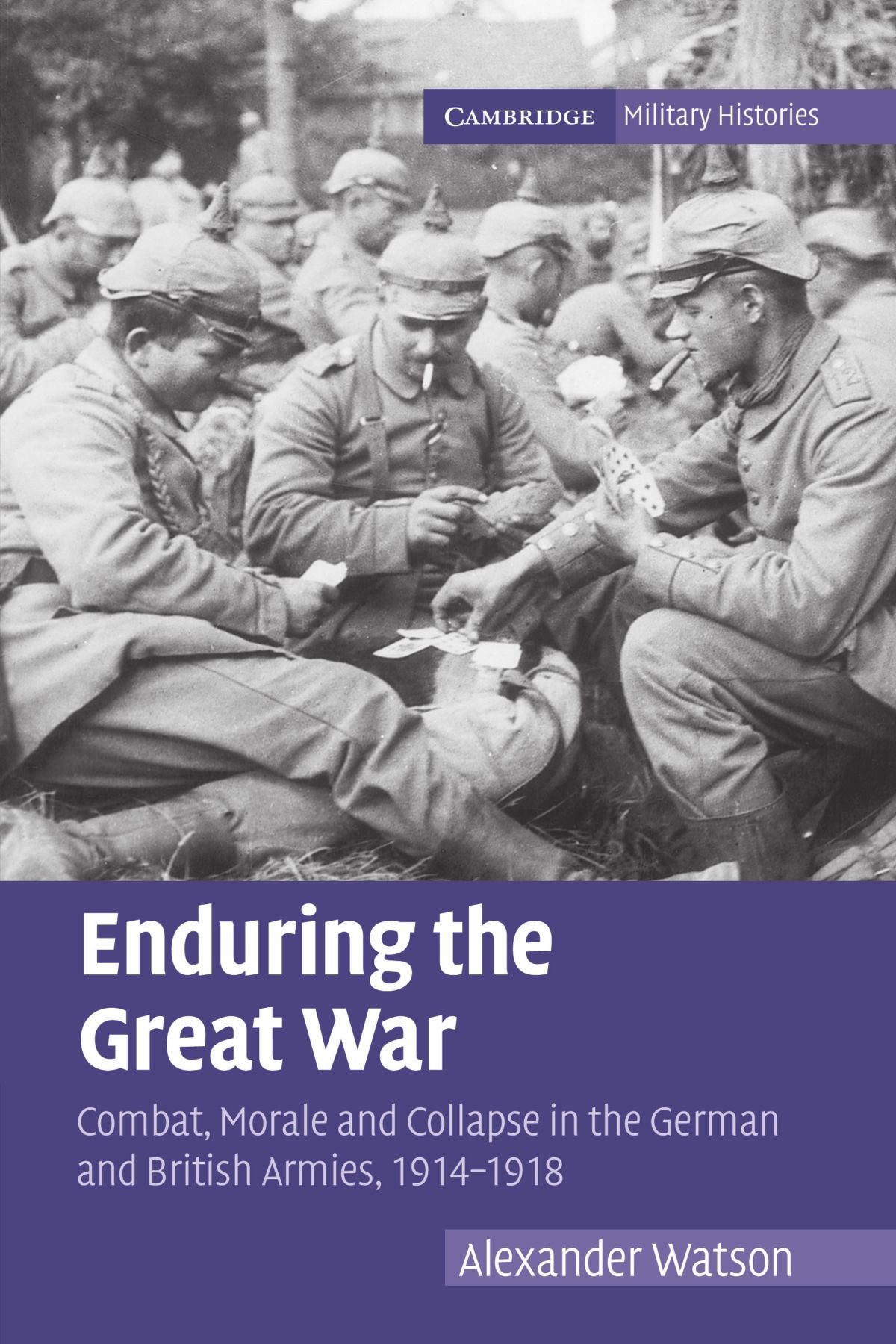 During the war the Great War, around 5% of German and British combatants suffered from psychiatric breakdown; Alexander Watson’s book seeks to answer why the other 95% were able to largely withstand the rigours of trench warfare with relatively few disciplinary problems or desertion.[1]
During the war the Great War, around 5% of German and British combatants suffered from psychiatric breakdown; Alexander Watson’s book seeks to answer why the other 95% were able to largely withstand the rigours of trench warfare with relatively few disciplinary problems or desertion.[1]
His book aims ‘to provide a new understanding of the impressive resilience demonstrated by the British and German armies during the First World war by focusing on individual’s soldiers psychology’. In particular, he seeks to explore what persuaded them to fight for so long and ultimately, why the German army collapsed in the second half of 1918.[2]
He largely achieves his objectives. Watson argues that soldiers fought for a variety of reasons. Many were inculcated with military loyalties which motivated men to defend their country and accept the legitimate authority of their countries military and political leaders.[3] Soldiers’ experience of active service did not lead to pacifism or liking the enemy and actually encouraged many to fight on.[4] Soldiers managed the stress at front through individual coping strategies believing in supernatural, religion or adopting a fatalistic attitude.[5] He also argues that unit cohesion, organisational loyalty to their unit or the army and hatred were also motivators.[6]
However, of critical importance to morale and motivation was the role of junior regimental officers which he argues has a ‘disproportionate influence on the battlefield’.[7] Officers gave soldiers direction and order on a chaotic battlefield, their skills kept men alive paternal heroic leadership by example built trust with their subordinates.[8]
His book also makes some controversial points. For example, he argues that 1914 was Britain’s year of crisis with the morale of the army, rather than during late 1917 (after Third Ypres) or early 1918 (during the German Spring Offensive). Watson posits that the performance of Britain regular professional army, sent over to France in August 1914 as the British Expeditionary Force, was significantly worse in many respects than the mass army of volunteers and conscript that replaced it from 1915 onwards. The 1914 army suffered more disciplinary problems, had more surrenders and had more soldiers captured than at any point of the war.[9] He suggested that the civilian army had a number of advantages over the regulars. The civilians knew what to expect of war, many had received significant training before they were deployed and the standard of man, in terms of physique, education and social standing was significantly higher.[10] This gave it much more resilience than the professional army that had proceeded it and was able to survive major crises when tested, such as when the 5th British Army was pushed back in March and April of 1918.[11]
The other point he makes is that the German collapse in the Autumn of 1918 was due fatigue and exhaustion. Many soldiers and officers saw the war was lost and apathy took over.[12] Watson rejects Wilhelm Deist’s interpretation of the German collapse as a ‘covert strike’ that aimed at ending the war at the front in 1918. Disintegration at the front was not the result of indiscipline or mutiny, but the German army reaching the limits of human human resilience.[13]
This work does suffer a bit from trying to cover such a huge topic and, as a consequence, has great breath but little depth. Watson’s examination of British morale stops after the German Spring offensive and does cover the Hundred Days up to the Armistice which is a minor omission. Also, Watson has little to say on his methodology. I would also agree with the points made by Stefan Goebel that Watson’s use of modern psychological research would suggest it is an unusually homogenous field from which he makes sweeping statements.[14] However, despite these minor gripes it is an excellent work and a must read for those with an interest in morale or motivation during the Great War.
Notes:
[1] Alexander Watson, Enduring the Great War. Combat, Morale, Collapse in the German and British Armies, 1914-1918 (Cambridge: CUP, 2008), p.43.
[2] Ibid., p.7.
[3] Ibid., p.233.
[4] Ibid.
[5] Ibid., pp.233-234.
[6] Ibid., pp.66-67, 69.
[7] Ibid., p109.
[8] Ibid., pp.111, 113.
[9] Ibid., pp.141-148.
[10] Ibid., p.149.
[11] Ibid., pp.155, 182.
[12] Ibid., p.235..
[13] Ibid., p.235..
[14] Stefan Goebel, Review of Alex Watson, Enduring the Great War (Cambridge: CUP, 2008), Journal of Contemporary History, Vol.45, No.4 (2006), pp.877-879.

